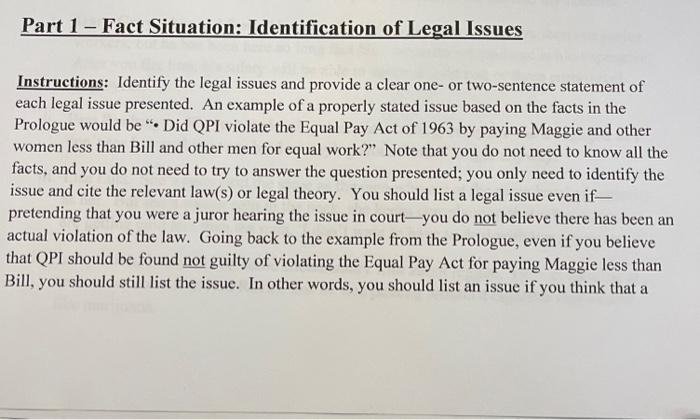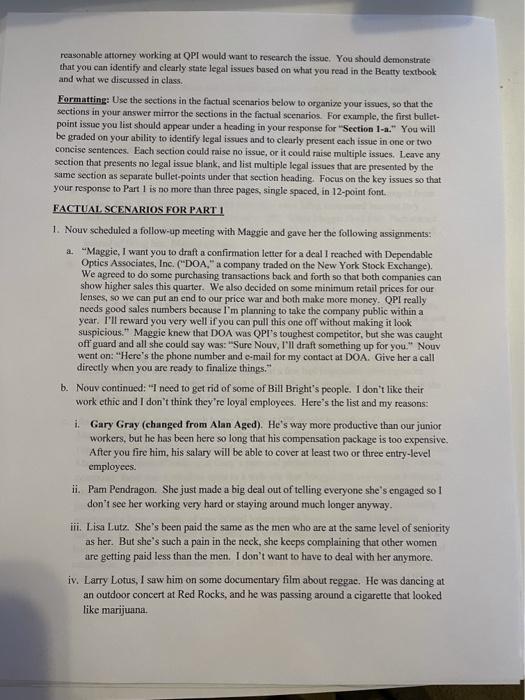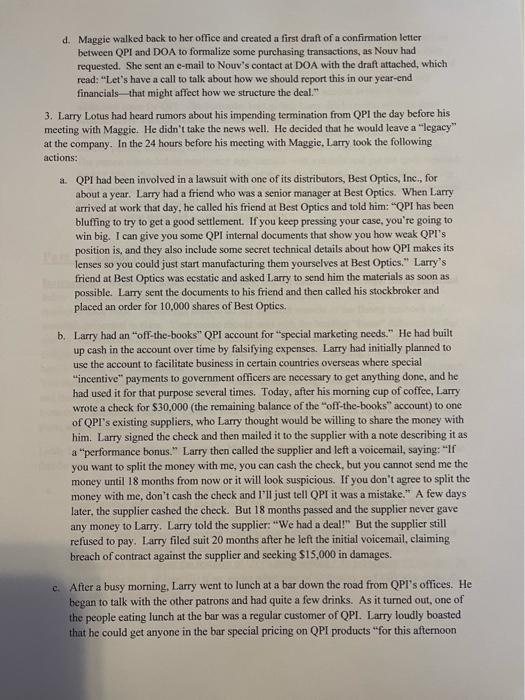



Part 1 - Fact Situation: Identification of Legal Issues Instructions: Identify the legal issues and provide a clear one- or two-sentence statement of each legal issue presented. An example of a properly stated issue based on the facts in the Prologue would be ". Did OPI violate the Equal Pay Act of 1963 by paying Maggie and other women less than Bill and other men for equal work?" Note that you do not need to know all the facts, and you do not need to try to answer the question presented; you only need to identify the issue and cite the relevant law(s) or legal theory. You should list a legal issue even if- pretending that you were a juror hearing the issue in court-you do not believe there has been an actual violation of the law. Going back to the example from the Prologue, even if you believe that QPI should be found not guilty of violating the Equal Pay Act for paying Maggie less than Bill, you should still list the issue. In other words, you should list an issue if you think that areasonable attorney working at OPI would want to research the issue. You should demonstrate that you can identify and clearly state legal issues based on what you read in the Beatty textbook and what we discussed in class. Formatting: Use the sections in the factual scenarios below to organize your issues, so that the sections in your answer mirror the sections in the factual scenarios. For example, the first bullet- point issue you list should appear under a heading in your response for "Section 1-a." You will be graded on your ability to identify legal issues and to clearly present each issue in one or two concise sentences. Each section could raise no issue, or it could raise multiple issues, Leave any section that presents no legal issue blank, and list multiple legal issues that are presented by the same section as separate bullet-points under that section heading. Focus on the key issues so that your response to Part I is no more than three pages, single spaced, in 12-point font. FACTUAL SCENARIOS FOR PART I 1. Nouv scheduled a follow-up meeting with Maggie and gave her the following assignments: a. "Maggic, I want you to draft a confirmation letter for a deal I reached with Dependable Optics Associates, Inc. ("DOA," a company traded on the New York Stock Exchange). We agreed to do some purchasing transactions back and forth so that both companies can show higher sales this quarter. We also decided on some minimum retail prices for our lenses, so we can put an end to our price war and both make more money. QPI really needs good sales numbers because I'm planning to take the company public within a year. I'll reward you very well if you can pull this one off without making it look suspicious.* Maggie knew that DOA was QPI's toughest competitor, but she was caught off guard and all she could say was: "Sure Nouv, I'll draft something up for you." Nouv went on: "Here's the phone number and e-mail for my contact at DOA. Give her a call directly when you are ready to finalize things." b. Nouv continued: "I need to get rid of some of Bill Bright's people. I don't like their work ethic and I don't think they're loyal employees. Here's the list and my reasons: i. Gary Gray (changed from Alan Aged). He's way more productive than our junior workers, but he has been here so long that his compensation package is too expensive. After you fire him, his salary will be able to cover at least two or three entry-level employees. ii. Par Pendragon. She just made a big deal out of telling everyone she's engaged so I don't see her working very hard or staying around much longer anyway ifi. Lisa Lutz. She's been paid the same as the men who are at the same level of seniority as her. But she's such a pain in the neck, she keeps complaining that other women are getting paid less than the men. I don't want to have to deal with her anymore. iv. Larry Lotus, I saw him on some documentary film about reggae. He was dancing at an outdoor concert at Red Rocks, and he was passing around a cigarette that looked like marijuana,d. Maggie walked back to her office and created a first draft of a confirmation letter between OPI and DOA to formalize some purchasing transactions, as Nouv had requested. She sent an c-mail to Nouv's contact at DOA with the draft attached, which read: "Let's have a call to talk about how we should report this in our year-end financials-that might affect how we structure the deal." 3. Larry Lotus had heard rumors about his impending termination from QPI the day before his meeting with Maggie. He didn't take the news well. He decided that he would leave a "legacy" at the company. In the 24 hours before his meeting with Maggie. Larry took the following actions: a. QPI had been involved in a lawsuit with one of its distributors, Best Optics, Inc., for about a year. Larry had a friend who was a senior manager at Best Optics. When Larry arrived at work that day. he called his friend at Best Optics and told him: "OPI has been bluffing to try to get a good settlement. If you keep pressing your case, you're going to win big. I can give you some OPI internal documents that show you how weak OPI's position is, and they also include some secret technical details about how QPI makes its lenses so you could just start manufacturing them yourselves at Best Optics," Larry's friend at Best Optics was ecstatic and asked Larry to send him the materials as soon as possible. Larry sent the documents to his friend and then called his stockbroker and placed an order for 10,000 shares of Best Optics. b. Larry had an "off-the-books" QPI account for "special marketing needs." He had built up cash in the account over time by falsifying expenses. Larry had initially planned to use the account to facilitate business in certain countries overseas where special "incentive" payments to government officers are necessary to get anything done, and he had used it for that purpose several times. Today, after his morning cup of coffee, Larry wrote a check for $30,000 (the remaining balance of the "off-the-books" account) to one of OPI's existing suppliers, who Larry thought would be willing to share the money with him. Larry signed the check and then mailed it to the supplier with a note describing it as a "performance bonus." Larry then called the supplier and left a voicemail, saying: "If you want to split the money with me, you can cash the check, but you cannot send me the money until 18 months from now or it will look suspicious. If you don't agree to split the money with me. don't cash the check and I'll just tell OPI it was a mistake." A few days later. the supplier cashed the check. But 18 months passed and the supplier never gave any money to Larry. Larry told the supplier: "We had a deal!" But the supplier still refused to pay. Larry filed suit 20 months after he left the initial voicemail, claiming breach of contract against the supplier and seeking $15,000 in damages. After a busy morning, Larry went to lunch at a bar down the road from QPI's offices. He began to talk with the other patrons and had quite a few drinks. As it turned out, one of the people eating lunch at the bar was a regular customer of QPI. Larry loudly boasted that he could get anyone in the bar special pricing on QPI products "for this afternoononly." Although the customer could see that Larry was clearly drunk, Larry insisted on selling a shipment of 1,000 high-end fashion eyewear lenses to the customer at a steep discount. The customer wrote up a contract with all of the necessary information, signed it, and gave it to Larry. Larry signed the contract and ordered another drink. Larry continued drinking at the bar telling the bartender that he needed to stay to make additional sales for OPI. The bartender kept giving Larry drinks (some of them free) because Larry's antics were so entertaining that they were drawing a crowd of paying patrons. Larry's "sales activity" ended when Larry was dancing on the bar and fell on another patron, smashing the patron's head onto a stool and breaking two of his teeth. The patron scheduled an emergency appointment with a dentist and got his teeth repaired for $17,525. The patron e-mailed a copy of the bill to Larry the following week, asking to be reimbursed, and copying the Human Resources department at QPI and the owner of the bar. The patron's e-mail said: "If Larry does not pay, I hope one of your businesses will do the right thing and cover my dentist's bill."














